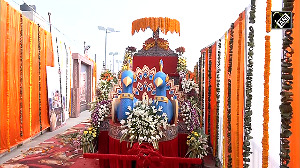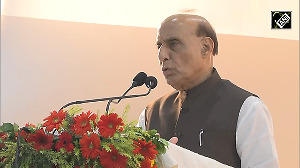The Andhra Pradesh legislative council has come into existence once again after a gap of 22 years. The council was abolished way back in 1985.
At a simple function at Raj Bhavan, Governor Rameshwar Thakur administered the oath of office to pro-tem legislative council chairman Puvvada Nageswara Rao on Monday morning.
Soon after, the Governor inaugurated the renovated council building located in the magnificent Jubilee Hall complex in the Public Gardens premises.
The pro-tem chairman later administered the oath of office to the other members of the newly-constituted council. Though the council has a total strength of 90 members, only 64 members took the oath on Monday.
Elections were conducted for 75 out of the 78 elected seats. The results of polls to 31 seats from the legislative assembly quota, eight seats each for graduates and teachers and five out of 28 local authorities' constituencies were announced.
However, the counting of votes for the remaining 26 local authorities' seats has been put on hold following an inquiry by the Election Commission into alleged irregularities in polling by the ruling Congress supporters in eight districts.
The Governor also filled up the seats of 12 nominated members. The state legislative council was first constituted on July 7, 1958 under Article 168 of the Constitution and inaugurated by the then President Dr Rajendra Prasad.
Madapati Hanumantha Rao was its first chairman. The council was abolished by the previous Telugu Desam government on May 31, 1985 since the then chief minister N T Rama Rao felt that it was redundant and caused a drain on the state exchequer.
However, it is believed that the real reason was that NTR found it difficult to push through controversial legislations and policy decisions in the Upper House which was at that time dominated by the Congress.
Incidentally, it was Congress government at the Centre under Rajiv Gandhi's stewardship that enacted AP Legislative Council (Abolition) Act, despite stiff opposition from state Congress leaders who argued that the scrapping the council was against the party's interests in the state.
Later, in 1990, the then Congress government made an attempt for revival of the council but in vain. Subsequently, the Congress again promised revival of the council in its manifesto for 2004 assembly polls. After snatching power from the Telugu Desam, the Congress made fresh efforts to revive the council.
Basing on a resolution passed by the state legislative assembly, the UPA government enacted the AP Legislative Council Bill in December 2005 for revival of the council. The Bill received the President's assent in January 2006 but it took almost a year for the Election Commission to complete the formalities for constitution of the council and for conduct of elections to fill the seats under various categories in the reconstituted Upper House.
After delimitation of graduates and teachers' constituencies, the enrolment of voters for these seats was done. Elections to teachers, graduates and local authorities' constituencies were held on March 17 this year.
The polls for the seats from Assembly quota were held on March 22. The election of the legislative council Chairman is scheduled on April 3 morning after receipt of nominations till Monday evening.
Senior Congress member A Chakrapani is likely to be unanimously elected as the first chairman of the revived council.
Though the members of the reconstituted council include a number of former ministers, ex-legislators and former parliamentarians mainly belonging to the Congress, only seven members served as members of legislative council earlier.
The MLCs enjoy the same privileges and perks as the members of the legislative assembly. The legislative council will have five special committees of its own relating to privileges, ethics, rules, papers laid and assurances, while the other committees will be common for both the Houses.
The legislative council, which is akin to the Rajya Sabha, will have only have an advisory role and no veto power. It has to approve all the Bills that are passed by the assembly. The council can only return a particular bill to the assembly for reconsideration.





